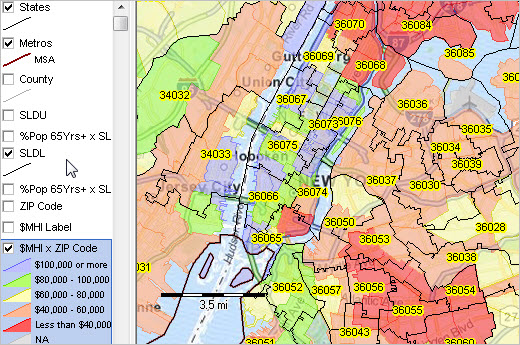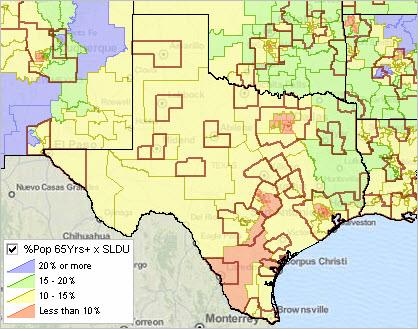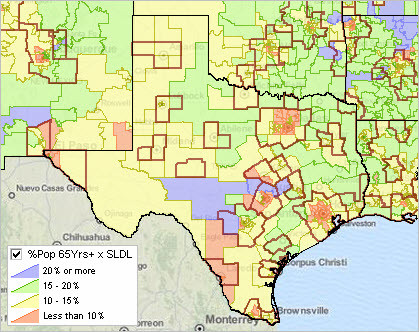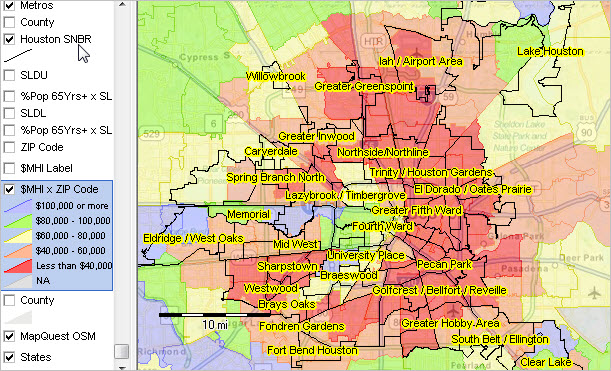

|
|
State Legislative District Data Analytics -- ACS 2014 General Demographics
January 2016. The importance of understanding the demographic-economic make-up and patterns for state legislative districts can hardly be overstated. Community and neighborhood challenges and opportunities are shaped by demographic-economic dynamics. Legislative district incumbents and stakeholders need this information to assess conditions and plan to meet the needs of residents. Only by knowing "where we are" can we develop the most effective plans for improvement. Use the GIS project to examine state legislative districts in context of neighborhoods and small area socioeconomic patterns (details below). General Demographics State legislative districts are diverse; they range in population from 2,706 to 971,140. The median age ranges from 19.5 years to 63.7 years. Use the interactive table below to view other demographic characteristics. Compare districts of interest. .. related sections/tables: Social.. Economic .. Housing characteristics. New York Metro House Districts & Economic Prosperity by ZIP Code Illustrative GIS application showing legislative districts contextually with other geography & subject matter. House districts black boundary & district code; patterns of median household income by ZIP code.  - View developed using CV XE GIS and related GIS project. - see below in this section about using this GIS project. This section is focused on tools, resources and methods that you can use to access, integrate and analyze state legislative district general demographics data. The U.S. national scope ACS 2014 (released December 2015) State Legislative District Demographic-Economic Dataset contains approximately 600 subject matter items tabulated for each state legislative district organized into four subject matter groups: • General Demographics -- this section • Social Characteristics • Economic Characteristics • Housing Characteristics See more about the importance of these data. Data reviewed in this section are based on the American Community Survey (ACS) 2014 5-year estimates for state legislative districts defined as of the 2014 legislative session. See notes on importance of these data. See similar ranking tables for: Congressional Districts | Census Tracts | ZIP Codes | State, Metro & County. Texas State Legislative Districts -- Upper Patterns of percent population age 65 years and over by upper/senate legislative district. Metros shown with red-brown boundary.  - View developed using CV XE GIS and related GIS project. Texas State Legislative Districts -- Lower Patterns of percent population age 65 years and over by lower/house legislative district. Metros shown with red-brown boundary.  - View developed using CV XE GIS and related GIS project. Get a Custom Map for Your State of Interest Use this form to request a no fee map graphic similar to the one shown above for a state of interest. Enter the request with state name in the text section; e.g., "Requesting state legislative district %population 65 years & over for Illinois SLDL." Using the Interactive Table Use the interactive ranking table in this section to view, query, rank, compare general demographics of the population, households and families for these areas. The scroll box shown below lists each of the subject matter items available for each area via the ranking table. In the subject matter items scrollbox, subject matter items are organized into to mini-tables with related items. The number at the left of the subject matter item is also used as the short name for the subject matter item in the column header in the ranking table. General Demographics Items
AGE AND GENDER
D001 Total population D002 Male D003 Female D004 Under 5 years D005 5 to 9 years D006 10 to 14 years D007 15 to 19 years D008 20 to 24 years D009 25 to 34 years D010 35 to 44 years D011 45 to 54 years D012 55 to 59 years D013 60 to 64 years D014 65 to 74 years D015 75 to 84 years D016 85 years and over D017 Median age (years) D018 18 years and over D019 21 years and over D020 62 years and over D021 65 years and over D022 18 years and over D023 Male D024 Female D025 65 years and over D026 Male D027 Female RACE D028 Total population D029 One race D030 Two or more races D031 One race D032 White D033 Black or African American D034 American Indian and Alaska Native D035 Cherokee tribal grouping D036 Chippewa tribal grouping D037 Navajo tribal grouping D038 Sioux tribal grouping D039 Asian D040 Asian Indian D041 Chinese D042 Filipino D043 Japanese D044 Korean D045 Vietnamese D046 Other Asian D047 Native Hawaiian and Other Pacific Islander D048 Native Hawaiian D049 Guamanian or Chamorro D050 Samoan D051 Other Pacific Islander D052 Some other race D053 Two or more races D054 White and Black or African American D055 White and American Indian and Alaska Native D056 White and Asian D057 Black or African American and American Indian and Alaska Native Race alone or in combination with one or more other races D058 Total population D059 White D060 Black or African American D061 American Indian and Alaska Native D062 Asian D063 Native Hawaiian and Other Pacific Islander D064 Some other race HISPANIC OR LATINO AND RACE D065 Total population D066 Hispanic or Latino (of any race) D067 Mexican D068 Puerto Rican D069 Cuban D070 Other Hispanic or Latino D071 Not Hispanic or Latino D072 White alone D073 Black or African American alone D074 American Indian and Alaska Native alone D075 Asian alone D076 Native Hawaiian and Other Pacific Islander alone D077 Some other race alone D078 Two or more races D079 Two races including Some other race D080 Two races excluding Some other race, and Three or more races D081 Total housing units State Legislative District ACS 2014 Interactive Tables -- General Demographics Click ShowAll button between Find/Queries. Use mouseover on column header to view column description. See usage notes below table. See related tables -- http://proximityone.com/rankingtables.htm. Usage Notes • If table not showing any rows; click ShowAll button below table. • Use vertical and horizontal scroll bars to navigate up/down or left/right. • Adjust column widths using column divider between header cells. • Type> -- use to select Upper/Senate (610) or Lower/House (620) • Find Name> button -- use to select district based on exact spelling of partial name in column 1. .. Key in exact up/low case spelling of partial name of district in the edit box to right of Find Name> button. .. overwriting the value "State House District 79". .. click the Find Name> button ... table refreshes with all districts with matched spelling in column 1. • Selected columns -- "Pop.W1.B1.AIAN1.Asn1.NHPI1.Hisp" below the table to show only these columns; .. click "All columns" button to restore view to all columns. • All items are estimates centric to mid-2012. • Click ShowAll button between specific area queries. • Cells with -1 value could not be estimated (for this geography and this time frame). State Legislative Districts GIS Project/Datasets 1. Install the ProximityOne CV XE GIS ... omit this step if CV XE GIS software already installed. ... run the CV XE GIS installer ... take all defaults during installation 2. Download the State Legislative Districts GIS Project fileset ... requires ProximityOne User Group ID (join now) ... unzip State Legislative Districts GIS project files to local folder State Legislative Districts GIS Project 3. Open the sld2014b.gis project ... after completing the above steps, click File>Open>Dialog ... open the file named C:\sld2014\sld2014b.gis 4. Done .. the start-up view is similar to Texas SLD graphic shown above. GIS Layers The GIS project includes these layers/shapefiles/datasets: 1. U.S. by state 2. U.S. by CBSA/Metro - set to MSA only at start-up 3. U.S. by County - check layer checkbox in legend to show in map window 4. Texas Primary and Secondary Roads - set to Interstate only at start-up; names as labels optionally turned on 5. Houston Super Neighborhoods (SNBR) - check layer checkbox in legend to show in map window The following graphic shows the SNBRs in context of patterns of economic prosperity (median household income) by ZIP code area. Use the GIS project to examine relationships between neighborhoods and state legislative districts. Click graphic for larger view (expand browser window for best quality view).  6. Texas State Legislative Districts - Upper with integrated DP1 demographics 7. Texas State Legislative Districts - Lower with integrated DP1 demographics 8. Texas ZIP Code Area with integrated selected demographic-economic items - initially set to patterns of median household income 9. MapQuest OpenStreetMaps Need assistance using any aspect of these tools or data? Join us in a Data Analytics Lab session. There is no fee for these one-hour Web sessions. State Legislative Districts State legislative districts are the areas from which members are elected to state or equivalent entity legislatures. State legislative districts are comprised of upper (senate) and lower (house) chambers. Nebraska has a unicameral legislature and the District of Columbia has a single council; these are treated as upper-chamber legislative areas in the interactive table. Importance of State Legislative District Demographic-Economic Data The American Community Survey provides "richer" demographic-economic characteristics for national scope 2014 session state legislative districts. Only ACS sourced data provide details on topics such as income and poverty, labor force and employment, housing value and costs, educational participation and attainment, language spoken at home, among many related items. The approximate 600 items accessible via the dataset are supplemented by a wide range of additional subject matter. ProximityOne User Group Join the ProximityOne User Group to keep up-to-date with new developments relating to metros and component geography decision-making information resources. Receive updates and access to tools and resources available only to members. Use this form to join the User Group. Support Using these Resources Learn more about accessing and using demographic-economic data and related analytical tools. Join us in a Data Analytics Lab session. There is no fee for these one-hour Web sessions. Each informal session is focused on a specific topic. The open structure also provides for Q&A and discussion of application issues of interest to participants. Additional Information ProximityOne develops geodemographic-economic data and analytical tools and helps organizations knit together and use diverse data in a decision-making and analytical framework. We develop custom demographic/economic estimates and projections, develop geographic and geocoded address files, and assist with impact and geospatial analyses. Wide-ranging organizations use our tools (software, data, methodologies) to analyze their own data integrated with other data. Follow ProximityOne on Twitter at www.twitter.com/proximityone. Contact us (888-364-7656) with questions about data covered in this section or to discuss custom estimates, projections or analyses for your areas of interest. |
|
|